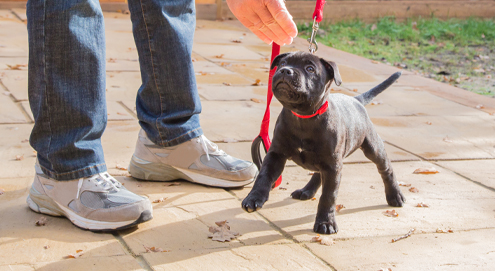Raising a puppy
Written by |
Finally! Your puppy arrived after waiting for a long time. Raising your little buddy properly is necessary to turn him into a loyal friend. This isn’t just for larger dog breeds. Small dog breeds need proper raising as well, otherwise, they can become out of control, or start biting your hands and feet. What do you need to know about raising a puppy? You’ll read all about it in this article.

Is a puppy course necessary?
It can be very sensible to bring your pup to a course. It’s fun, educational for you and your dog, and he can learn how to socialise with other dogs. The course teacher can give you plenty of helpful tips on how to teach your dog new things. If you would like to know more about this subject. Read our Puppy course, yes or no? article, or our Puppy socialisation blog.
How do I raise my puppy?
As soon as your pup gets home, the learning process starts. Your puppy is constantly learning, so it’s important to think about what you want to teach your pup. Your dog needs to know what his owner is expecting from him. It needs to be clear who’s in charge and what is or isn’t allowed. Your puppy will try everything. If he gets the idea that this behaviour is rewarded, he will continue to repeat this. Keep in mind that attention is a reward. This counts for both negative and positive attention.
Reward your puppy
Reward good behaviour. Make sure to do this the right way. You need to reward your pup instantly after the desired behaviour, otherwise, he will forget what he is rewarded for.
Unwanted behaviour
Try to make sure your puppy doesn’t get tempted to fall into undesired behaviour. Preventing is easier than unlearning this behaviour. Don’t have shoes and socks lying around, and provide alternatives he can bite and chew on. Puppies learn with their mouths! To learn more about this, read our article ‘how to stop your pup from biting’.
It can be difficult, but try to ignore unwanted behaviour. If you tell your pup off, you still give him attention. Like we said before, negative attention is attention. Once your pup is calm and the unwanted behaviour has stopped, you can reward him.
Intervene when necessary
Sometimes is necessary to intervene. This could be when the behaviour is dangerous to you, your pup, other people or animals. At that moment, you can firmly say ‘NO’ and distract him from the behaviour by clapping your hands. Your pup will forget what he was doing. Make sure to keep his attention on you. If he does, reward him.
Reward and correct your pup with your voice
It’s important to stay consistent in your own behaviour towards your puppy. Make sure to establish some agreements in your household, so everyone treats the puppy in the same way.
Down below we’ll give you tips and suggestions for certain situations:
- Giving food to your puppy: Feed your pup first before eating yourself. This will prevent begging. You could teach your dog to stay in his bed while the family is eating.
- Playing with your puppy: Playing should be fun for the dog and owner! Sometimes, your pup needs to ‘win’ the game, so it stays fun for him too. You don’t have to worry about ranking issues. It is important to play when you feel like it. You can accept a playing invitation from your dog when you want to, or send him away/ignore him. If you don’t want to play yourself, make sure your puppy has enough toys to release that energy and to keep him busy. Change the toys from time to time and don’t have many toys scattered all over your floor. You can have 2 toys lying around. This will keep the toys interesting for your dog.
- Sleeping: Your puppy needs a lot of sleep. An active pup is only active for about 4/6 hours a day. This means that a high energy pup sleeps for about 18-20 hours. A calm pup will sleep even more. Some puppies struggle to find some rest themselves. You might have to help your pup out. A crate can offer a perfect solution if you use it correctly. If you want to know more, read our article about crate training.
- Giving your pup attention: You decide whether or not your pup should get some attention. Of course, you can give him attention when he askes for it (only in the right way, not with unwanted behaviour), but you don’t always have to. Make sure to be clear though.
- Try to think ahead: Think about what behaviour you want to see when your dog is all grown up. A pup is fun to have on the couch or your lap, but you might not want this when he’s 40 kg. It’s the same for allowing your pup to jump on you. If you don’t want to have this behaviour later, you should start training your dog now.
What else do I need to think about when raising my puppy?
You are not done with raising your puppy when he doesn’t know what is or isn’t allowed. He also needs to be house trained, needs to learn how to walk on a leash and how to stay home alone.
Do you have any questions left about this subject? You can ask your questions at veterinarian@vetsend.co.uk



